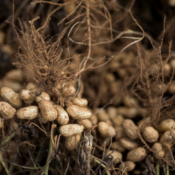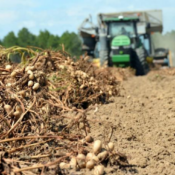
U.S. peanut tour inspires Malawians
Much like south Georgia, agriculture drives the economy in Malawi, and farming is a way of life for much of the population. As demand for tobacco dropped over recent years, Malawi’s farmers turned to peanuts.
Ten years ago, the Georgia Peanut Tour welcomed its first visitor from the Southern African nation of Malawi, where peanuts are part of the local cuisine but are
mostly grown in small gardens or bought in informal markets. Over the next decade, visitors from Malawi attended the tour every year, traveling halfway around
the world to see how farmers, shellers, researchers and others work together to get a large crop of peanuts to consumers every year.
Much like south Georgia, agriculture drives the economy in Malawi, and farming is a way of life for much of the population. As demand for tobacco dropped over
recent years, Malawi’s farmers turned to peanuts — or groundnuts, as they are called in Africa — as a new cash crop.
That transition made the Georgia Peanut Tour a valuable resource for agricultural leaders in Malawi looking to organize peanut production, improve extension
systems and scale up shelling and storage.
Creating Malawi's tour
In April, Malawi debuted its 2024 Groundnut Tour, attracting visitors from across the continent to learn how the industry has developed in the country.
“Each year, we look forward to the Georgia Peanut Tour as a week when peanut people from across the U.S. and Malawi can get together and talk about different
aspects of peanut production and marketing, including how we plant and harvest the crop, control pests, manage seed systems, test for aflatoxin and other
topics,” said Jamie Rhoads, assistant director of the Feed the Future Innovation Lab for Peanut, which is headquartered in the University of Georgia’s College of
Agricultural and Environmental Sciences.
“To be able to replicate a tour in Malawi fulfilled a dream for a lot of people, and it is great to be part of it.”
The Innovation Lab, funded through the U.S. Agency for International Development (USAID), operates in several African countries to improve peanut production and
processing while promoting peanuts as a source of nutrition and developing new markets. Work in Malawi is organized through a project funded by USAID and the
Republic of Ireland.
The production scale in Malawi is very different than in the U.S., with most farmers working only 1 or 2 acres. Most of the labor – from planting to harvesting to
shelling — is done by hand.
Despite these challenges, Malawi’s government has declared a goal to produce 1 million metric tons of groundnuts by 2030, an ambitious campaign that would
more than double the current production.
Precious Mtengezo explains ongoing research to a crowd at the 2024 Groundnut Tour in Malawi.
Because Africa’s population is growing, improving peanut production practices will allow its farmers to create the supply to feed more people, said Bob Parker, the
former president and CEO of the National Peanut Board, the organization that represents U.S. peanut farmers.
Parker gave the keynote speech on the third day of the tour, urging decision-makers in Malawi to look within Africa for a market. While population growth in the U.S.
and Europe is mostly stagnant, Africa will see a population boom over the next 20 years that will lead to increased food demand.
“It’s hard to grow an industry that is already mature. When you look at growing the peanut industry in Malawi, I think you have a great opportunity, considering the
population growth here, in the countries around you and in this part of the world,” Parker told the crowd. “I encourage you to consider how you can harness that
growth and increased demand.”
Much like its Georgia progenitor, the Malawi tour included two days of visits to research stations, farms, a buying point and a shelling plant, plus a day of hot-topic
discussions. The event attracted visitors from across Eastern and Southern Africa, USAID representatives, Ireland's ambassador to Malawi, and the diplomatic
representative for the U.S. Embassy.
“This week, we are hosting people from across the world who are in the groundnut industry to see what we are doing to improve the production of groundnuts in
Malawi. After that, we expect to see an increase in the number of farmers who will be producing different types of groundnuts for products within the region, but
also outside of the continent,” said Sam Kawale, Malawi’s minister of agriculture.
Source: https://www.farmprogress.com/peanut/u-s-peanut-tour-inspired-malawians
All Categories
Recent Posts
Unlocking Africa’s Potential Afroseeds’ Commitment to High-Quality Crops for a Global Market”
New Discovery in Peanut Defense Mechanisms Offers Hope forDisease Resistance
U.S. peanut tour inspires Malawians
Agriculture & Organic Farms
+0123 (456) 7899
contact@example.com



